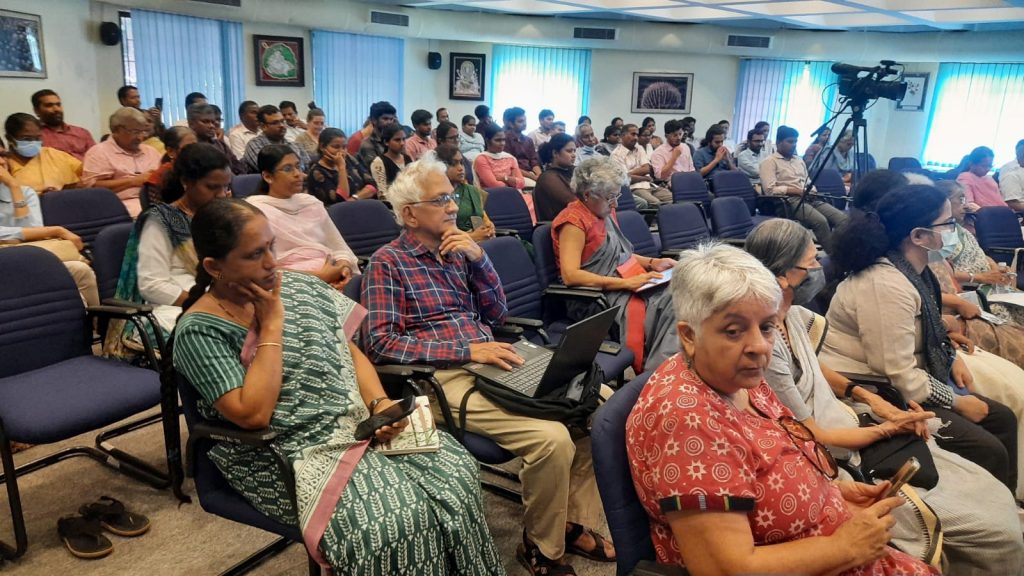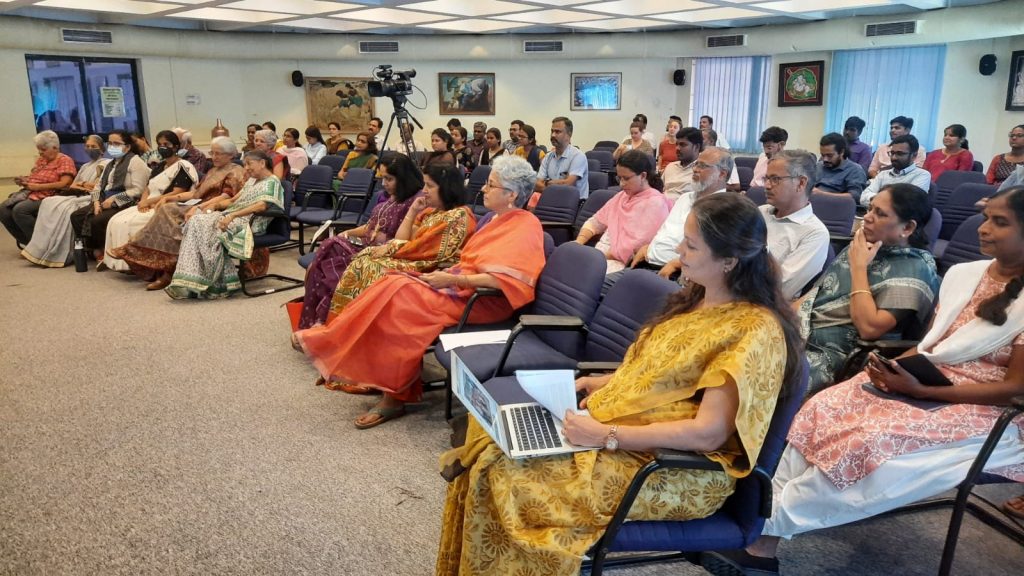A panel discussion titled ‘Who Cares? Progress and Challenges for Early Childhood Development’ was hosted by MSSRF on the occasion of Ms Mina Swaminathan’s Birth Anniversary on April 3, at M S Swaminathan Research Foundation, Chennai. In her welcoming note, Dr Soumya Swaminathan, Chairperson – MSSRF, noted that Ms Mina Swaminathan, co-founder of MSSRF, was instrumental in designing the first twenty-five years of MSSRF and ensured a focus on gender, especially working women and children, with a specific emphasis on childhood development in the age group 0-6 years, and added that her mother was one of the architects of the mobile crèche, preschool education, and teacher training programme during the inception of the Integrated Child Development Services (ICDS). Dr Soumya highlighted that it is critical to examine from all aspects, the achievements and challenges of Early Childhood Care and Development (ECCD) in the context of shifting influences such as climate change or global conflicts.
The event began with songs rendered by Ms Bindumalini, an song artist, who recalled fond memories with Ms Mina Swaminathan, and paid a soulful musical tribute to her through the songs of Kabir, Basavanna, and Bharathiyar.
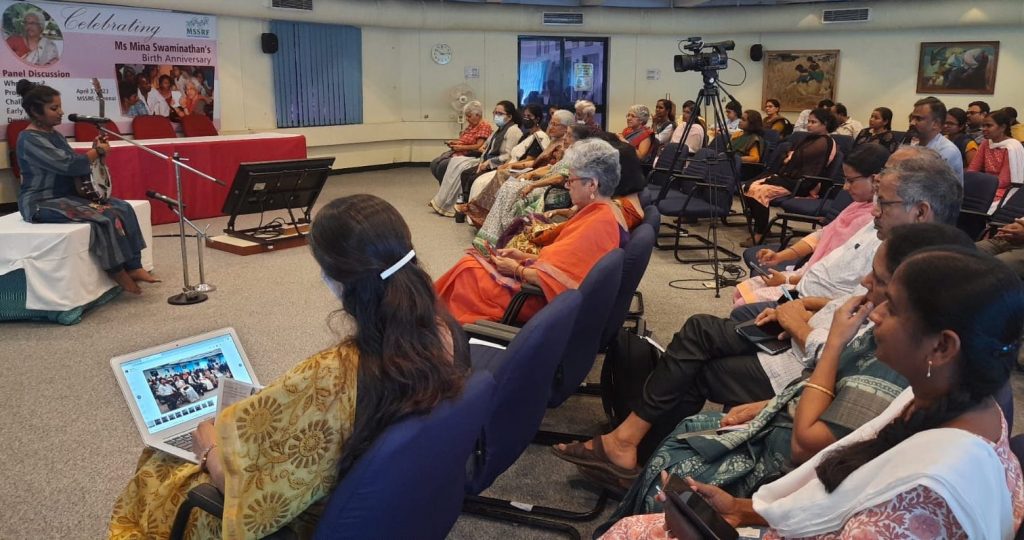
The formal part of the programme was the panel discussion moderate by Dr Anjana Mangalgiri, Senior Fellow, Institute of Social Sciences, New Delhi, set the context while acknowledging Ms Mina’s strength came from the grassroots, and her ways of influencing policy discourse and dialogues from experiences with rural communities. Dr Anjana detailed the trifolds of Minaji’s vision:
- To emphasise the importance of multiple types of intervention that are necessary for a child’s first six years of life, encompassing health, nutrition, protection, sanitation, early learning, etc., all of which have an impact on the child’s growth and development.
- The need for these interventions to be available to all children that could not be accomplished by any welfare approach, but must be recognised by the government and incorporated within the system to ensure large-scale delivery.
- To evaluate childcare from the perspective of women’s and child’s rights, highlighting working women’s triple burden of earning a living, domestic work, and childcare.
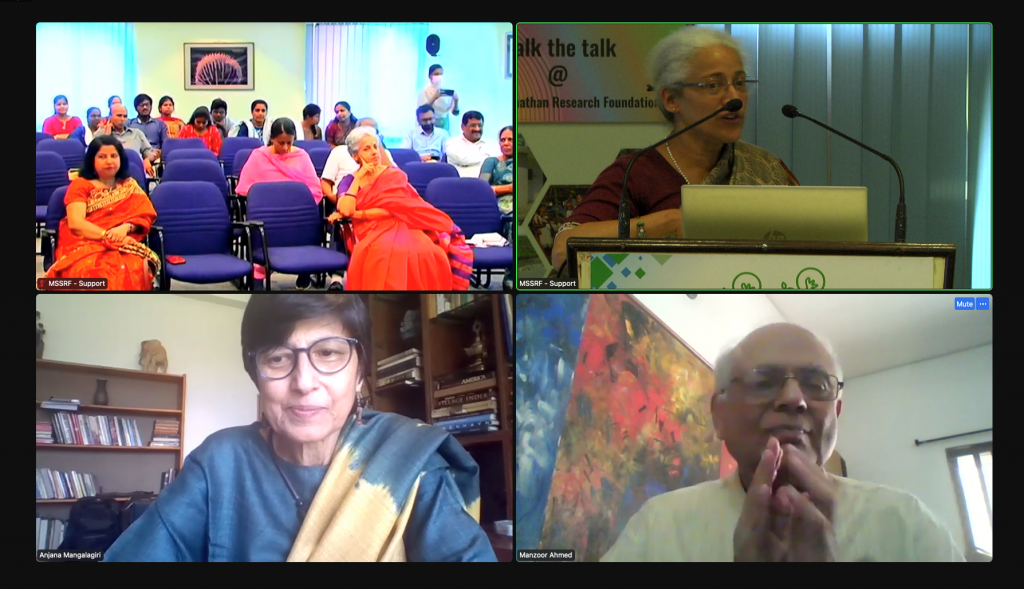
Dr Adarsh Sharma, former Director of the National Institute of Public Cooperation and Child Development in New Delhi, described the cherished five-decade journey with her mentor, Ms Mina Swaminathan. She recalled Ms Mina’s participation in the seminal research ‘Quality Matters’ as well as contributing to her books ‘The First Five Years of Life’ and ‘Disciplinary Dialogues on Social Transformation,’ as well as coordinating the ‘Suraksha series’ of exemplary practises in early childhood education with her. She also emphasised that policy formulations must be creative, and stakeholders must comprehend and effectively contextualise sensitive subjects ranging from maternity benefits to the right to education for children under six.
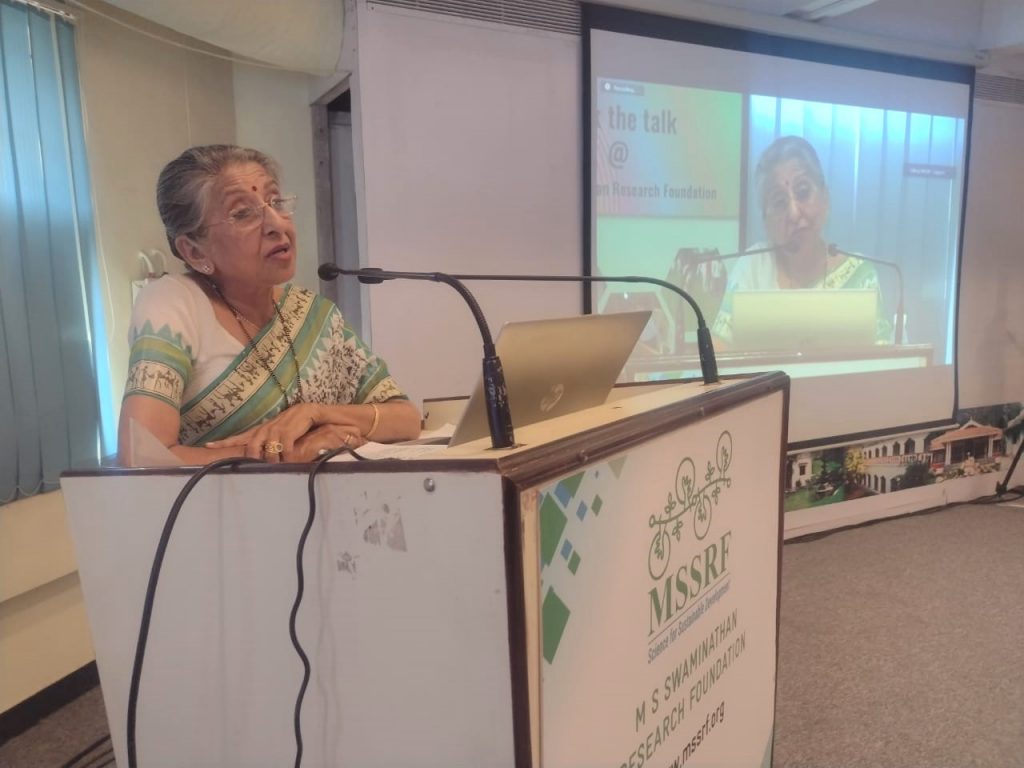
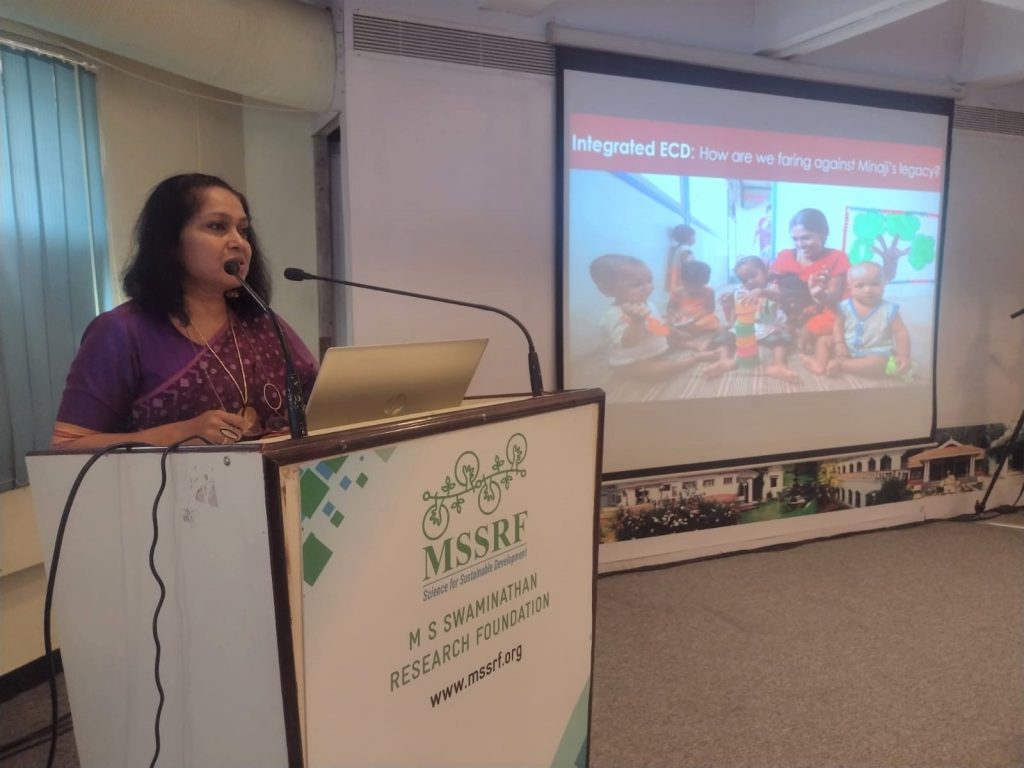
Dr Sumitra Mishra, Executive Director, Mobile Creches, New Delhi, began her presentation by recognising how Ms Mina built the framework for the integrated and holistic Early Childhood Development policy. She stated that, although ICDS and preschool education are prioritised as universal programmes, a significant percentage of children are left out of the ICDS, preschool, or EECE programmes, and ironically the annual ICDS budget allocation decreased. The legal and policy evolution of EECE in the country is well-advanced, and employer-mandated childcare is currently a topic of worldwide debate. Though the 2017 maternity benefits amendment provides working mothers with provisions for childcare, nursing breaks, and the availability of crèche facilities, it only covers women employed in the formal sector, leaving the remaining 90% of the workforce out, making it a conditional benefit rather than a universal benefit. Post-COVID, women are quitting the workforce in record numbers throughout the world, with India leading the way. As a result, there is a need for policymakers to be firmer in their implementation of these programmes.
Dr Manzoor Ahmed, Professor Emeritus, BRAC Institute of Educational Development, Dhaka, stated that according to the World Bank, 89 million children under the age of five are at risk of not reaching their developmental potential in terms of intellectual, emotional, social, and physical growth expected for their age in the eight countries of South Asia. “Except for individuals who can afford costly corrective measures, this shortfall may never be recovered,” he voiced. South Asian children’s cognitive and linguistic skills are equivalent to those of American children during the first few months of life, but they lag behind as they get older. This implies that when the impacts of what the children bring from their mother’s womb wear off, the need for more extraneous care and stimulation becomes more vital. Likewise, disparities in social groups has an effect on the cognitive skill development. Most of these concerns have been widely debated, and certain policies have been developed, but this is due to a failure to create the circumstances and establish the necessary environment to implement such excellent policy prescriptions.
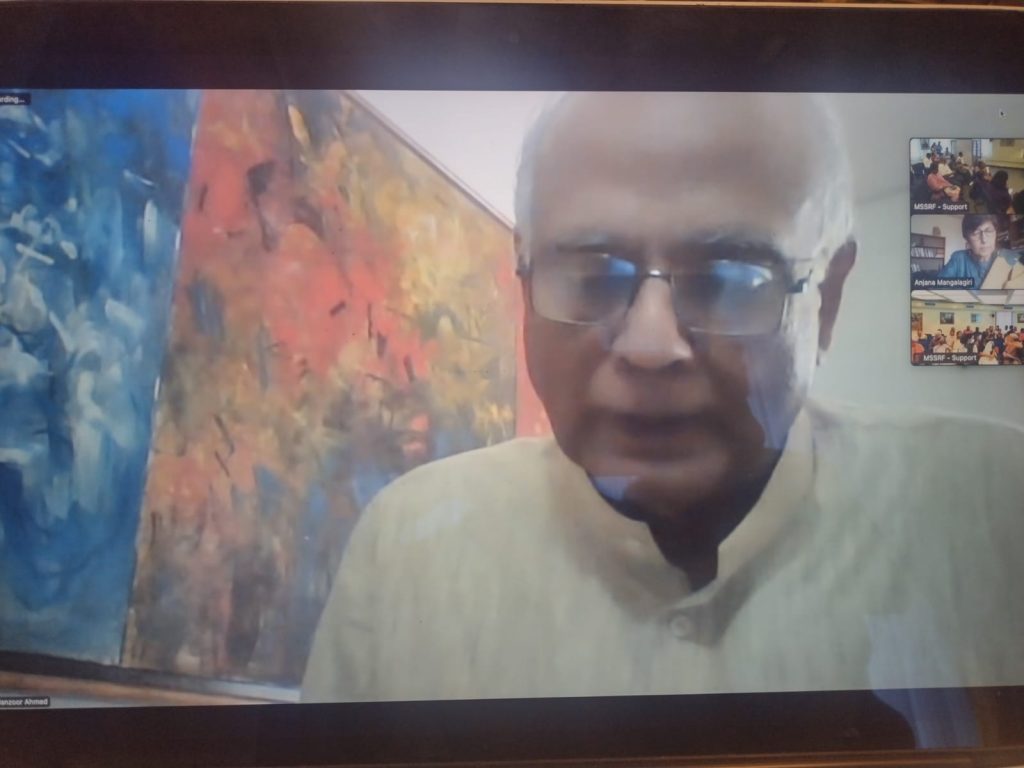
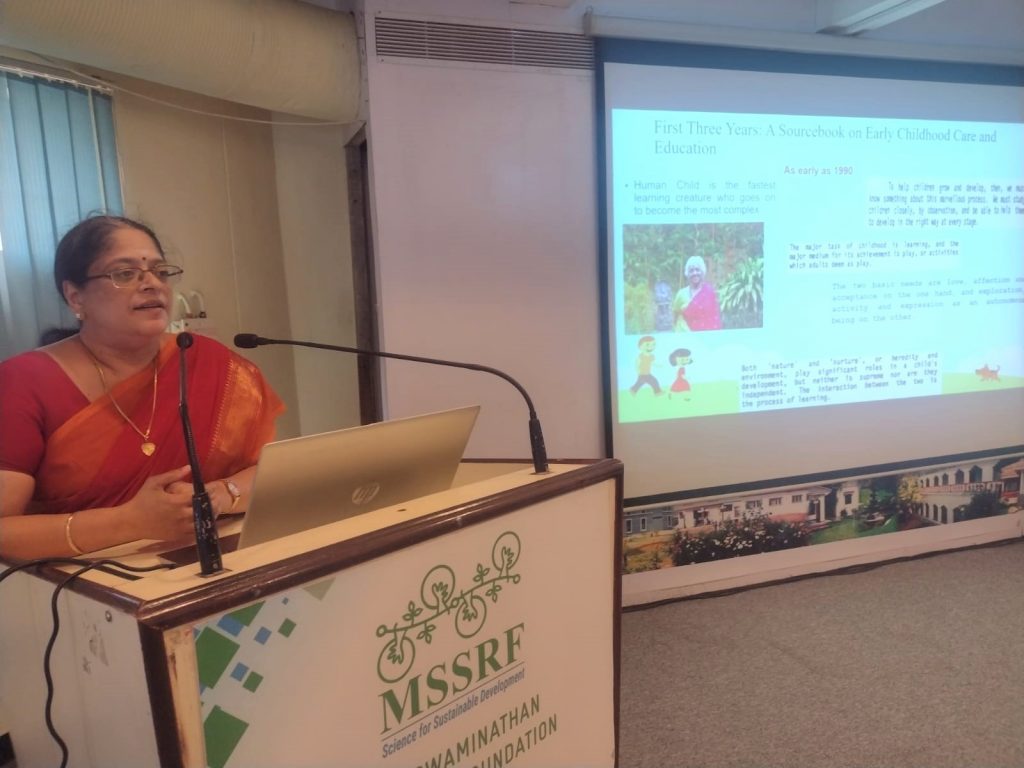
Dr R Sujatha, Consultant, SGD – UNICEF India with the Planning & Development Department, Government of Tamil Nadu, spoke on how ECCE implies leaving no child behind, hence a framework for disability-inclusive education is needed. “Children with impairments, their care, the strategy, how we assess outcome indicators, and the targets must all be defined,” she said. The right of every child to learn with his/her peers is one of the critical components when we are speaking about inclusion. The notion of using a right-based approach rather than a philanthropically charity-based one is gaining traction, and Tamil Nadu is leading the way in this aspect when it comes to social justice.
In the open discussion, speakers answered questions from the audience. The experts addressed the ideal age for foundational education, as well as the problems of having a mixed-age classroom in India. The debate also explored how panchayat development plan funds could be allocated to ECCE development and combating malnutrition at the local level. Prof Nitya Rao, Professor of Gender and Development at the University of East Anglia, UK, and Trustee MSSRF, concluded the session with a thank you note.
